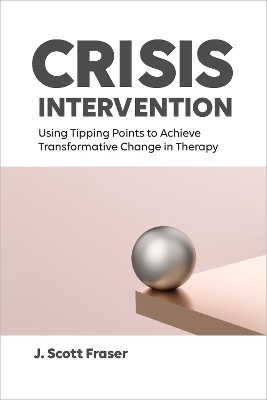
Crisis Intervention
American Psychological Association (Verlag)
978-1-4338-4334-1 (ISBN)
- Noch nicht erschienen (ca. Februar 2025)
- Versandkostenfrei
- Auch auf Rechnung
- Artikel merken
Most mental health practitioners have been taught to do risk assessments and to reduce danger to their clients and those around them. However, many providers lack a thorough understanding of the cause and nature of mental health crises and struggle to safely and successfully provide crisis intervention. Instead of seeking to return clients in crisis to their previous baseline, providers can seize the opportunity presented by crises and tip them toward rapid resolution.
In Part One of the book, J. Scott Fraser outlines his Process of Change model, a clear and concrete approach to understanding crises in their proper context; engaging with clients through their values, culture, and language; honoring their goals; and breaking cycles of crisis for good. In Part Two, he shows how different types of crises—trauma, suicidality, grief, intimate partner violence, and sexual assault—reflect similar vicious cycles. Real life case studies illustrate the Process of Change model in action, demonstrating how each of those cycles can be tipped toward resolution by embracing the contextual process of change perspective.
J. Scott Fraser, PhD, is a clinical psychologist with nearly 40 years of clinical practice, supervision, training, and academic teaching. He has served as director of internship training, associate dean, and director of clinical training and as professor of clinical psychology in the doctoral program at the School of Professional Psychology at the Wright State University in Dayton, Ohio. Before that, he was director of a crisis/brief therapy center in a large general hospital setting for 14 years. He has published many papers and books, including Unifying Effective Psychotherapies: Tracing the Process of Change (APA Books, 2018) and the DVD titled The Process of Change in Integrative Psychotherapy, which uses the process model described in this book.
Acknowledgements
Preface. Wei Ji: The Chinese Characters for Crisis
Part I. Crisis, Chaos, Catastrophe and the Process of Change
Introduction: Tipping Point Interventions and the Process of Change
Chapter 1. Traditional Crisis Intervention and its Problems
Chapter 2. The Theory Base for the Process of Change Model in Crisis Intervention and Brief Therapy
Chapter 3. Viewing Crises Through the Process of Change
Chapter 4. Doing Crisis Intervention from the Process View
Part II. Tipping Point Interventions Across Crises: Following the Process of Change Model
Chapter 5. Trauma: Stress, Disorder, and Growth
Chapter 6. Suicidal Crises: Hazardous Intersections
Chapter 7. Grief and Mourning
Chapter 8. Intimate Partner Violence: Time Limited Windows of Opportunity
Chapter 9. Sexual Assault: Intervening in Culturally Shaped Crises
Chapter 10. Tipping Points and Windows of Opportunity
| Erscheint lt. Verlag | 14.2.2025 |
|---|---|
| Verlagsort | Washington DC |
| Sprache | englisch |
| Maße | 152 x 229 mm |
| Themenwelt | Geisteswissenschaften ► Psychologie ► Klinische Psychologie |
| Medizin / Pharmazie ► Medizinische Fachgebiete ► Psychiatrie / Psychotherapie | |
| ISBN-10 | 1-4338-4334-X / 143384334X |
| ISBN-13 | 978-1-4338-4334-1 / 9781433843341 |
| Zustand | Neuware |
| Haben Sie eine Frage zum Produkt? |
aus dem Bereich


